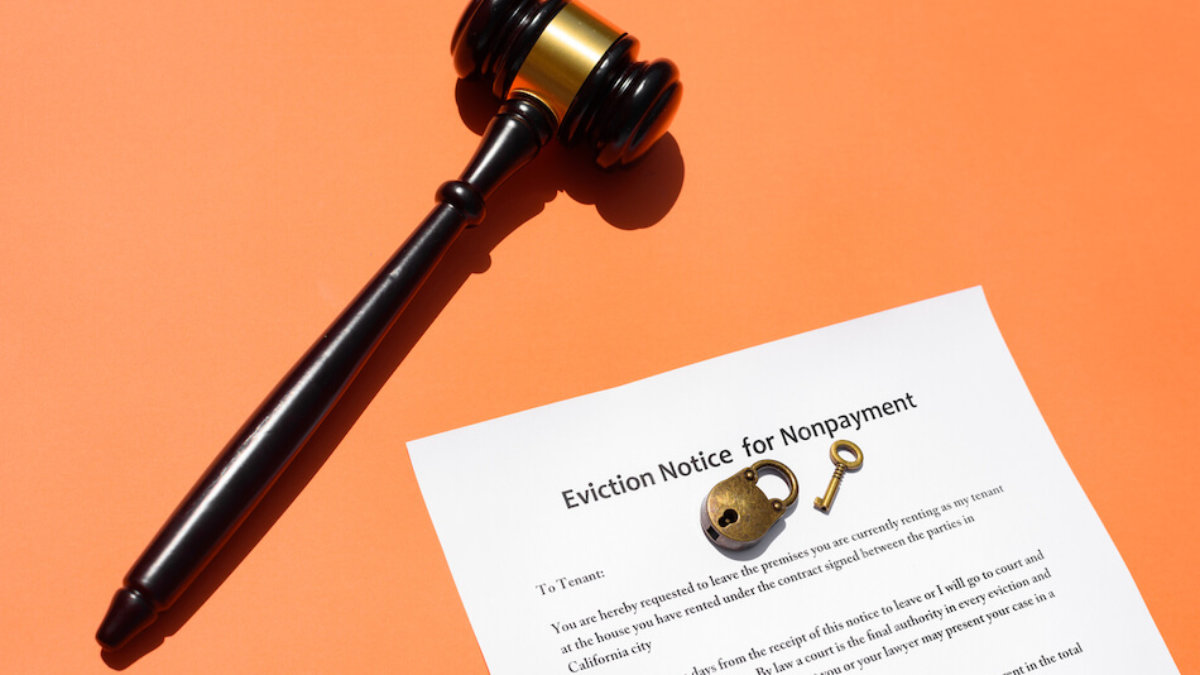Home>Finance>What Happens If You Don’t Pay Late Fee For Rent


Finance
What Happens If You Don’t Pay Late Fee For Rent
Published: February 22, 2024
Learn the consequences of not paying late fees for rent and how it impacts your finances. Find out what you need to know about late rent payments and financial implications. Protect your financial health with this essential information.
(Many of the links in this article redirect to a specific reviewed product. Your purchase of these products through affiliate links helps to generate commission for LiveWell, at no extra cost. Learn more)
Table of Contents
Introduction
Understanding Late Fees for Rent
Late fees for rent are charges imposed by landlords or property management companies when tenants fail to pay their rent on time. These fees are typically outlined in the lease agreement and serve as a deterrent against late payments. While late fees can vary depending on the terms of the lease and local regulations, they are generally applied after a grace period, which is usually a few days after the due date. It's important for tenants to be aware of the late fee policy outlined in their lease to avoid any potential repercussions.
Late fees are designed to incentivize timely rent payments and compensate landlords for the inconvenience and financial strain caused by late payments. However, failing to pay these fees can lead to a range of consequences, including financial penalties, strained landlord-tenant relationships, and even legal action. It's crucial for tenants to understand the implications of not paying late fees for rent and explore available options for addressing these situations in a responsible manner.
Late fees for rent are a significant aspect of the tenant-landlord relationship and can have a substantial impact on both parties. By gaining a comprehensive understanding of late fees and their implications, tenants can navigate their rental agreements more effectively and maintain positive relationships with their landlords. In the following sections, we will delve into the consequences of not paying late fees for rent, the legal ramifications involved, and the various options for addressing these issues in a proactive and informed manner.
Understanding Late Fees for Rent
Late fees for rent are charges imposed by landlords or property management companies when tenants fail to pay their rent on time. These fees are typically outlined in the lease agreement and serve as a deterrent against late payments. While late fees can vary depending on the terms of the lease and local regulations, they are generally applied after a grace period, which is usually a few days after the due date.
Late fees are designed to incentivize timely rent payments and compensate landlords for the inconvenience and financial strain caused by late payments. They also help ensure that tenants fulfill their financial obligations punctually, contributing to the smooth operation of rental properties. It's important for tenants to be aware of the late fee policy outlined in their lease to avoid any potential repercussions.
Landlords often use late fees as a means of encouraging responsible financial behavior among tenants. By imposing these fees, landlords seek to reinforce the importance of meeting payment deadlines and upholding the terms of the lease agreement. This practice also helps landlords maintain consistent cash flow, covering property expenses and mortgage payments on schedule.
Tenants should familiarize themselves with the specific late fee structure outlined in their lease agreement to understand the financial implications of late payments. By doing so, they can prioritize timely rent payments and avoid incurring additional costs. Understanding the late fee policy can also enable tenants to communicate effectively with their landlords in case of financial difficulties or unexpected circumstances that may affect their ability to pay rent on time.
In summary, late fees for rent are a standard component of lease agreements, serving as a mechanism to promote timely rent payments and compensate landlords for the inconvenience caused by late payments. Tenants should proactively review and comprehend the late fee provisions in their lease agreements to uphold their financial responsibilities and maintain positive relationships with their landlords.
Consequences of Not Paying Late Fees for Rent
When tenants fail to pay late fees for rent, they may face a range of consequences that can impact their financial well-being and their relationship with their landlord. It’s essential for tenants to understand these potential repercussions to make informed decisions regarding their rental obligations.
Financial Penalties: One of the immediate consequences of not paying late fees for rent is the accrual of additional financial penalties. These penalties can exacerbate the financial burden on tenants, making it increasingly challenging to catch up on overdue payments. As a result, tenants may find themselves in a cycle of escalating debt, potentially leading to further financial strain.
Strained Landlord-Tenant Relationships: Non-payment of late fees can strain the relationship between tenants and landlords. Landlords rely on timely rent payments to maintain their properties and meet financial obligations. When tenants fail to pay late fees, it can erode trust and create tension between the two parties. This strained relationship may lead to difficulties in addressing future rental issues and could impact the possibility of lease renewal.
Negative Impact on Rental History: Failure to address late fees can result in a negative impact on a tenant’s rental history. This can make it challenging to secure future rental accommodations, as landlords often conduct background checks and reference inquiries. A history of unpaid late fees may raise concerns for prospective landlords, potentially limiting housing options for tenants in the future.
Legal Action: In severe cases of non-payment, landlords may pursue legal action to recover unpaid late fees and overdue rent. This can result in court proceedings, eviction notices, and damage to the tenant’s credit history. Legal action can significantly escalate the consequences of not paying late fees, leading to additional financial burdens and legal complexities for tenants.
Impact on Credit Score: Unpaid late fees and rent can negatively impact a tenant’s credit score. This can hinder the tenant’s ability to secure loans, credit cards, or future housing arrangements. A damaged credit score can have long-term implications, affecting various aspects of the tenant’s financial life beyond the immediate rental situation.
Understanding these consequences underscores the importance of addressing late fees for rent in a timely and responsible manner. Tenants should prioritize open communication with their landlords and explore feasible solutions to mitigate the impact of late fees on their financial stability and rental history.
Legal Ramifications of Not Paying Late Fees for Rent
Non-payment of late fees for rent can have legal implications that tenants should be aware of to navigate their rental obligations effectively. While the specific legal ramifications may vary based on local regulations and the terms of the lease agreement, understanding the potential legal consequences is crucial for tenants.
Lease Violation: By failing to pay late fees as stipulated in the lease agreement, tenants may be in violation of their rental contract. Lease violations can provide landlords with grounds for taking legal action, including eviction proceedings. It’s essential for tenants to adhere to the terms of their lease to avoid potential legal disputes and maintain their rights as tenants.
Eviction Proceedings: Persistent non-payment of late fees and rent can lead to eviction proceedings initiated by the landlord. Landlord-tenant laws typically outline the legal process for eviction, including notice periods and court proceedings. Eviction can have serious implications for tenants, impacting their housing stability and legal record.
Civil Litigation: Landlords have the option to pursue civil litigation to recover unpaid late fees and rent. This legal recourse can result in court hearings and potential financial judgments against the tenant. Civil litigation can lead to additional financial burdens and legal complexities for tenants, underscoring the importance of addressing late fees promptly.
Impact on Rental References: Non-payment of late fees can impact a tenant’s rental references, potentially leading to negative feedback from landlords in future rental applications. Landlords often provide references for former tenants, and a history of late fee non-payment can diminish a tenant’s credibility and desirability as a renter.
Credit Reporting: Landlords may report unpaid late fees and rent to credit bureaus, impacting a tenant’s credit report and score. Negative credit reporting can have long-term consequences, affecting the tenant’s ability to secure future housing and financial opportunities.
Tenants should be mindful of the legal implications of not paying late fees for rent and take proactive measures to address any financial challenges that may impact their ability to fulfill their rental obligations. Open communication with landlords and a proactive approach to resolving late fee issues can help mitigate the risk of legal disputes and uphold the tenant’s legal standing within the rental agreement.
Options for Dealing with Late Fees for Rent
When facing late fees for rent, tenants have several options for addressing these financial obligations and mitigating potential consequences. It’s essential for tenants to explore these options and communicate openly with their landlords to find mutually beneficial solutions.
Timely Payment: The most straightforward approach to dealing with late fees for rent is to make timely payments. By prioritizing rent payments and associated late fees, tenants can avoid accruing additional financial penalties and maintain a positive rental history. Budgeting and financial planning can help tenants ensure timely payments and prevent late fee accumulation.
Open Communication: Transparent communication with landlords is crucial when facing challenges related to late fees. If tenants anticipate difficulties in paying rent and associated late fees, they should proactively communicate with their landlords to discuss feasible solutions. Landlords may be willing to negotiate payment plans or offer temporary relief based on the tenant’s circumstances.
Negotiation: Tenants can explore the option of negotiating late fees with their landlords. In cases where late fees have accrued due to unforeseen circumstances or financial hardships, landlords may consider adjusting or waiving late fees as a gesture of goodwill. Effective negotiation and a respectful approach can facilitate mutually beneficial agreements between tenants and landlords.
Seeking Financial Assistance: Tenants facing financial challenges that impact their ability to pay rent and late fees may consider seeking financial assistance from local resources, nonprofit organizations, or government agencies. These entities may offer support programs or financial counseling to help tenants address their rental obligations and avoid further financial strain.
Legal Consultation: In complex situations involving legal ramifications or disputes related to late fees, tenants may seek legal consultation to understand their rights and options. Legal professionals specializing in landlord-tenant law can provide valuable guidance and representation, particularly in cases where tenants face eviction or civil litigation due to late fee non-payment.
Financial Planning and Budgeting: Implementing effective financial planning and budgeting strategies can help tenants proactively manage their expenses, including rent and late fees. By prioritizing financial stability and responsible budgeting, tenants can mitigate the risk of accruing late fees and navigate their rental obligations more effectively.
By considering these options and taking proactive steps to address late fees for rent, tenants can uphold their financial responsibilities, maintain positive relationships with their landlords, and mitigate the potential consequences of late fee non-payment.
Conclusion
Understanding the implications of late fees for rent is essential for tenants to navigate their rental responsibilities effectively and maintain positive relationships with their landlords. Late fees serve as a mechanism to incentivize timely rent payments and compensate landlords for the inconvenience caused by late payments. Failing to address late fees can lead to a range of consequences, including financial penalties, strained landlord-tenant relationships, and potential legal ramifications.
Tenants should prioritize timely rent payments and familiarize themselves with the late fee provisions outlined in their lease agreements. Open communication with landlords and proactive engagement in addressing financial challenges can help tenants mitigate the impact of late fees and maintain their rental standing.
Exploring options such as negotiation, seeking financial assistance, and effective financial planning can empower tenants to address late fees responsibly and prevent the escalation of financial burdens. Transparent communication and a collaborative approach to resolving late fee issues can foster positive landlord-tenant relationships and contribute to a harmonious rental experience.
By recognizing the significance of late fees for rent and taking proactive measures to address them, tenants can uphold their financial obligations, preserve their rental history, and mitigate the potential repercussions of late fee non-payment. Ultimately, a proactive and informed approach to late fees can contribute to a stable and mutually beneficial tenant-landlord relationship, enhancing the overall rental experience for all parties involved.














